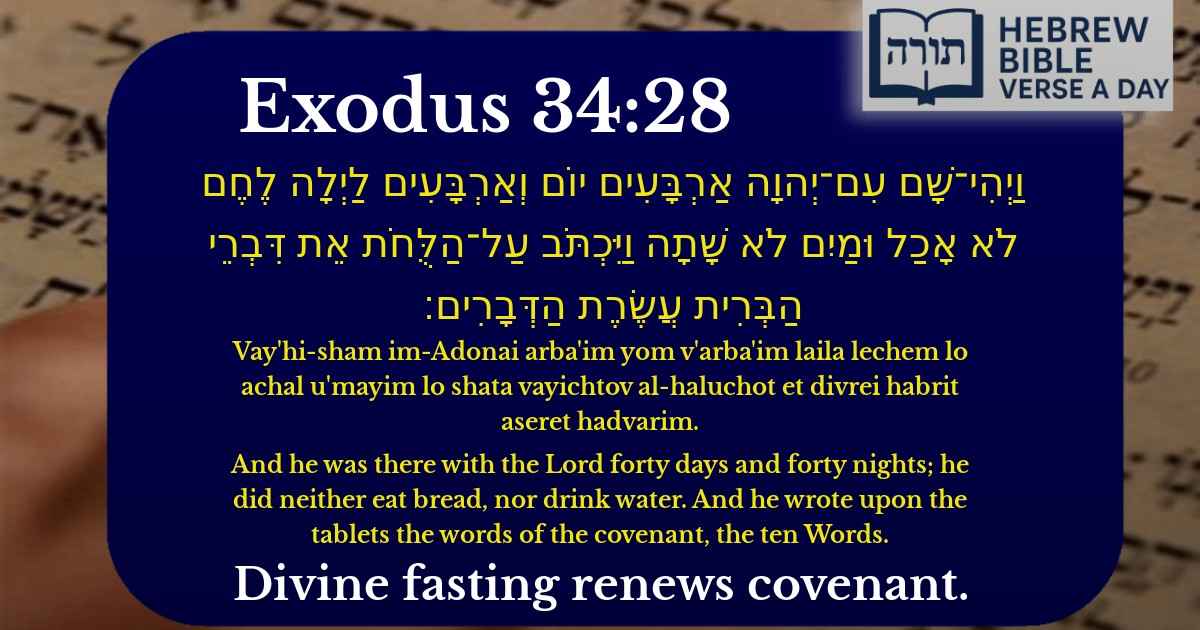Join Our Newsletter To Be Informed When New Videos Are Posted
Join the thousands of fellow Studends who rely on our videos to learn how to read the bible in Hebrew for free!
Hebrew Text
וַיְהִי־שָׁם עִם־יְהוָה אַרְבָּעִים יוֹם וְאַרְבָּעִים לַיְלָה לֶחֶם לֹא אָכַל וּמַיִם לֹא שָׁתָה וַיִּכְתֹּב עַל־הַלֻּחֹת אֵת דִּבְרֵי הַבְּרִית עֲשֶׂרֶת הַדְּבָרִים׃
English Translation
And he was there with the Lord forty days and forty nights; he did neither eat bread, nor drink water. And he wrote upon the tablets the words of the covenant, the ten Words.
Transliteration
Vay'hi-sham im-Adonai arba'im yom v'arba'im laila lechem lo achal u'mayim lo shata vayichtov al-haluchot et divrei habrit aseret hadvarim.
Hebrew Leining Text
וַֽיְהִי־שָׁ֣ם עִם־יְהֹוָ֗ה אַרְבָּעִ֥ים יוֹם֙ וְאַרְבָּעִ֣ים לַ֔יְלָה לֶ֚חֶם לֹ֣א אָכַ֔ל וּמַ֖יִם לֹ֣א שָׁתָ֑ה וַיִּכְתֹּ֣ב עַל־הַלֻּחֹ֗ת אֵ֚ת דִּבְרֵ֣י הַבְּרִ֔ית עֲשֶׂ֖רֶת הַדְּבָרִֽים׃
Parasha Commentary
📚 Talmud Citations
This verse is quoted in the Talmud.
📖 Yoma 4b
The verse is referenced in the discussion about Moses' stay on Mount Sinai for forty days and nights without eating or drinking, emphasizing the miraculous nature of his experience.
📖 Ta'anit 9a
The verse is cited in the context of discussing the significance of forty days and nights as a period of divine revelation and preparation.


The Forty Days and Nights with Hashem
According to Rashi (Shemot 34:28), Moshe Rabbeinu spent forty days and nights on Har Sinai without eating bread or drinking water because he had ascended to a heavenly realm where physical sustenance was unnecessary. This supernatural state reflects his complete devotion to receiving the Torah and his total immersion in divine wisdom. The Rambam (Moreh Nevuchim 3:51) explains that Moshe reached such a lofty spiritual level that his physical needs were temporarily suspended.
The Significance of Forty Days
The Writing of the Luchot
Rashi (Shemot 34:1) explains that the second set of Luchot were written by Moshe at Hashem's command, unlike the first set which were entirely Hashem's work. The Talmud (Nedarim 38a) teaches that this demonstrates Moshe's greatness - that he could write with the same divine quality as Hashem Himself. The Sforno notes that this writing occurred specifically during the forty day period when Moshe was in this elevated spiritual state.
The Ten Commandments as Covenant
The phrase "divrei habrit" (words of the covenant) emphasizes, as Ramban explains, that the Aseret Hadibrot contain the essence of the entire Torah covenant between Hashem and Israel. The Mechilta notes that all 613 mitzvot are alluded to in these ten fundamental principles. The term "dibrot" rather than "mitzvot" (as pointed out by Ibn Ezra) indicates these are not merely commandments but foundational statements that create the relationship between Hashem and His people.